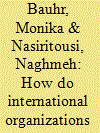| Srl | Item |
| 1 |
ID:
123626


|
|
|
|
|
| Publication |
2013.
|
| Summary/Abstract |
Does perceived corruption in recipient countries reduce support for foreign aid in donor countries? This under-explored yet salient question is examined using the 2009 Eurobarometer survey for the 27 EU countries. We suggest that perceived corruption can cause aid fatigue but that this relationship is highly contextualized. The results show that perceptions about corruption in developing countries reduce overall support for aid among respondents in donor countries. However, this effect is mitigated by country and contextual-level effects and different understandings of what we call the "aid-corruption paradox," namely that the need for foreign aid is often the greatest in corrupt environments. Three different dynamics of the aid-corruption paradox influence support for aid: moral, pragmatic, and strategic understandings. In EU-15 countries, the effect of perceived corruption in recipient states on aid fatigue can be substantially altered if aid is motivated by moral reasons for helping poor countries or if the purpose of aid is understood to improve governance. In new member states (NMS-12), the effect is reduced if respondents believe that the result of aid can serve national interests. The results provide new insights into the public opinion/development policy nexus, which suggest a number of salient policy recommendations and future areas for research.
|
|
|
|
|
|
|
|
|
|
|
|
|
|
|
|
| 2 |
ID:
117452


|
|
|
|
|
| Publication |
2012.
|
| Summary/Abstract |
How do international organizations (IOs) promote quality of government (QoG) and reduce corruption? IOs play a central role in most accounts of power in international relations. However, our understanding of how IOs exercise power seldom moves beyond the traditional material-normative dimensions of power. We suggest that an important dimension to understand IO power is the contestation-integration dimension, where IOs can exercise power either by integrating countries into networks of cultural exchange or by contesting existing orders. By analyzing multilateral aid data and building on recent advances in our understanding of the effectiveness of IO anti-corruption work, we apply this framework to show how the contestation-integration dimension helps us understand the success or failure of anti-corruption strategies. We show that when IOs contest existing orders using governance rankings and aid conditionality, they suffer from ideational shortcomings, including lack of objective data and contested policy advice. In contrast, measures based on integration, such as the membership process of IOs or interaction with IOs, are more likely to suffer from internal procedural shortcomings, such as IOs failing to internalize and mainstream the norms that they seek to promote. Our findings have implications for both understanding conditions that limit the diffusion of the international anti-corruption agenda and advancing our knowledge of IO power and its limits.
|
|
|
|
|
|
|
|
|
|
|
|
|
|
|
|